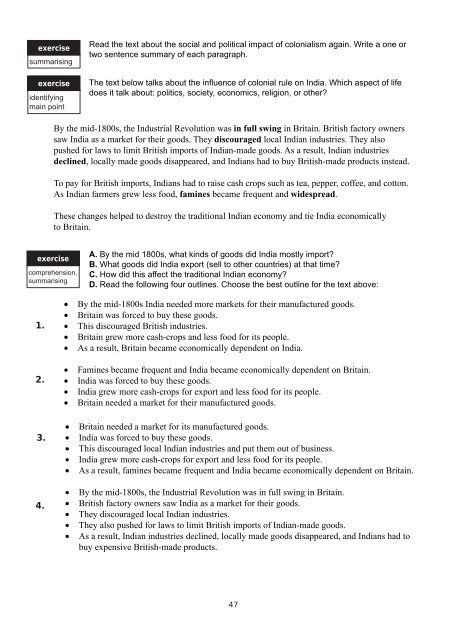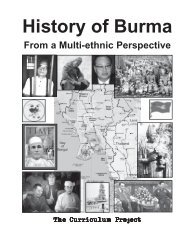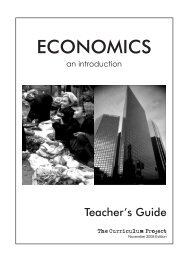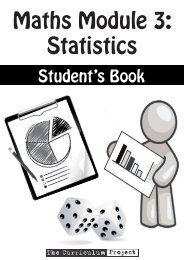Student's Book â Dec 2009 (5.9mb) - The Curriculum Project
Student's Book â Dec 2009 (5.9mb) - The Curriculum Project
Student's Book â Dec 2009 (5.9mb) - The Curriculum Project
Create successful ePaper yourself
Turn your PDF publications into a flip-book with our unique Google optimized e-Paper software.
exercisesummarisingexerciseidentifyingmain pointRead the text about the social and political impact of colonialism again. Write a one ortwo sentence summary of each paragraph.<strong>The</strong> text below talks about the influence of colonial rule on India. Which aspect of lifedoes it talk about: politics, society, economics, religion, or other?By the mid-1800s, the Industrial Revolution was in full swing in Britain. British factory ownerssaw India as a market for their goods. <strong>The</strong>y discouraged local Indian industries. <strong>The</strong>y alsopushed for laws to limit British imports of Indian-made goods. As a result, Indian industriesdeclined, locally made goods disappeared, and Indians had to buy British-made products instead.To pay for British imports, Indians had to raise cash crops such as tea, pepper, coffee, and cotton.As Indian farmers grew less food, famines became frequent and widespread.<strong>The</strong>se changes helped to destroy the traditional Indian economy and tie India economicallyto Britain.exercisecomprehension,summarisingA. By the mid 1800s, what kinds of goods did India mostly import?B. What goods did India export (sell to other countries) at that time?C. How did this affect the traditional Indian economy?D. Read the following four outlines. Choose the best outline for the text above:1.2.3.4.• By the mid-1800s India needed more markets for their manufactured goods.• Britain was forced to buy these goods.• This discouraged British industries.• Britain grew more cash-crops and less food for its people.• As a result, Britain became economically dependent on India.• Famines became frequent and India became economically dependent on Britain.• India was forced to buy these goods.• India grew more cash-crops for export and less food for its people.• Britain needed a market for their manufactured goods.• Britain needed a market for its manufactured goods.• India was forced to buy these goods.• This discouraged local Indian industries and put them out of business.• India grew more cash-crops for export and less food for its people.• As a result, famines became frequent and India became economically dependent on Britain.• By the mid-1800s, the Industrial Revolution was in full swing in Britain.• British factory owners saw India as a market for their goods.• <strong>The</strong>y discouraged local Indian industries.• <strong>The</strong>y also pushed for laws to limit British imports of Indian-made goods.• As a result, Indian industries declined, locally made goods disappeared, and Indians had tobuy expensive British-made products.47













![[Eng] Nov 2012 DRAFT - The Curriculum Project](https://img.yumpu.com/45590859/1/184x260/eng-nov-2012-draft-the-curriculum-project.jpg?quality=85)


